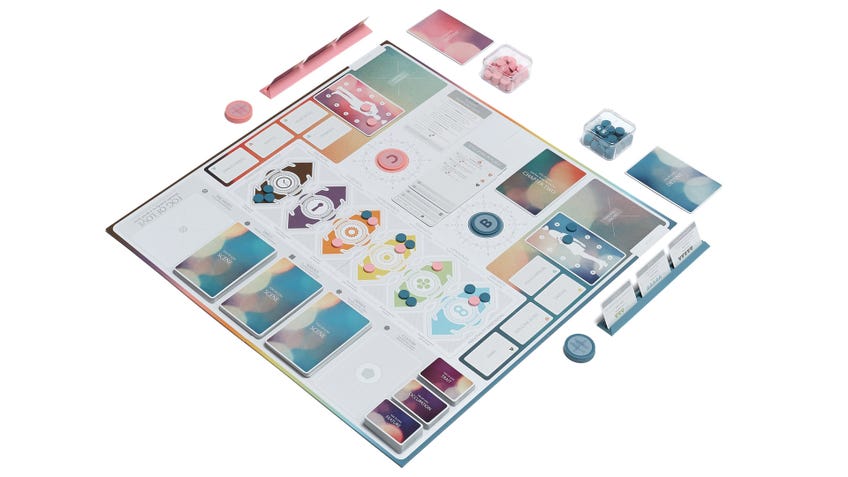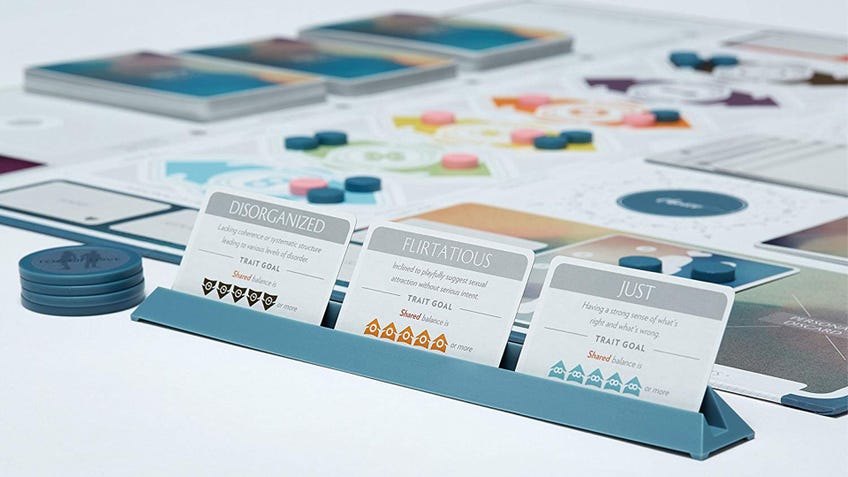The real-life romance, loss and legacy behind relationship sim board game Fog of Love
Jacob Jaskov’s heartfelt passion project for his partner became a groundbreaking moment for tabletop gaming - but it took a personal toll.
When Jacob Jaskov returned to board gaming in the 2010s he found that the hobby he loved had moved on a lot from the roleplaying games of the ‘90s that he remembered.
There were new mechanics, new ideas and hundreds of new games. But there wasn’t very much outside of those classically geeky tropes of sci-fi and fantasy that he enjoyed. For his partner, the idea of these games was much less appealing.
“She was interested in the beginning, but then she lost interest very quickly,” Jaskov recalls. “Because all the games, even though they had evolved dramatically, still catered to a certain kind of person.”
And so, an idea began to grow. He set about creating a game his partner would enjoy, with themes and ideas that fit her own tastes and sensibilities.
“We watched Netflix together. […] I enjoy sci-fi, action, that kind of thing. But she preferred dramas and romcoms. […] And so I thought, what about a romcom game? How could that work?”

From there, Fog of Love was born. Jaskov set off with a singular idea and an audience of one. A board game that told a story about love, where players took on the roles of characters in a romantic plot.
“It’s not a game in the sense that you have to win or lose,” he explains. “It’s about the story you want to create, and create together. Whether you fulfil your goals or not is only important to you.”
When he presented the idea to his local board game community it was met with a mixture of confusion and delight. He recalls entering a game jam in Copenhagen as a thoroughly strange launch for his passion project: “They talked for hours about the game and whether it counted for what they considered a board game […] They decided in the end not to give it an award, but they talked for half the evening before they finally settled on that decision.”
It was important that these relationships could always end too, and that players could feel safe in that.
Jaskov went away and worked on his design. “The mechanics were not there,” he admits, as he discusses some of the flaws of that early prototype. In particular the breakup mechanic was something that he struggled with for a while. With the crux of the game focusing on falling in love, it felt out-of-step to have such a big part of the design focused around breakups that often never happened. “It was important for my wife,” says Jaskov. “It was important that these relationships could always end too, and that players could feel safe in that.”
He continued to work on the game, playtesting it again and again with his wife and a handful of others. When Fog of Love finally launched on Kickstarter in 2016 it was met with strong praise from the board gaming community. Though it was still controversial among board game traditionalists, it was much-loved by many for attempting something that had never been done before; “No-one had ever made a game about love,” says Jaskov. For its proponents, which included many reviewers and influencers, it proved that games could explore complex and nuanced themes outside of the well-trodden areas that the hobby had grown used to. A handful of awards followed.
Soon, those outside of the hobby began to take notice too. Mainstream outlets such as Forbes and Newsweek began to introduce it to a whole new world.
This success was unexpected. From an audience of one, and then dozens, the game became quickly known to hundreds of thousands of people. For Jaskov, a consultant and self-described “innovator”, his first board game began as a passion project. But when we discuss that initial idea it becomes obvious that business came shortly after the romantic gesture: “It was a signal, for me, that there was a gap in the market.”
It was a signal, for me, that there was a gap in the market.
In no time at all Jaskov’s personal gesture was forever transformed into a commercial product. There was no putting the genie back in the lamp. Soon there would be suppliers, manufacturers, shipping, logistics. Fog of Love eventually went on sale in major retailers, including Walmart in the US.
During our conversation I try to understand what it feels like to put into the world a product that is so deeply personal as well as a commercial success. There are thousands of books, films and albums that have done this - but when it comes to board games the sensation is almost entirely unheard of.
Jaskov speaks with the natural confidence of someone who is well-practised at PR. He talks easily about his design process, the story of the game and its selling points. But when we discuss his personal life outside of the rehearsed elevator pitch, his answers don’t flow as easily. It isn’t until 30 minutes into our conversation that his marriage is discussed in contemporary terms.
“We’re actually divorced now.”

Jaskov admits that the project became all-consuming for himself and, by extension, his family. We touch briefly upon the topic of regret; although there are very few things that he says he would change, the way Fog of Love affected his family is one of them. “I would work less and spend more time with my family.”
“It was difficult for us,” he says, as he talks about the strain this fixation played in his life. His wife, who was at best an ambivalent board gamer when the project began, had become muse, playtester and marketing copy for a game which had grown far beyond the two of them. There was, like in every separation, a range of reasons and motivations - but just as it is impossible to talk about Fog of Love without talking about its origins, it is impossible to talk about the end of the project without talking about breakups.
Fog of Love was eventually sold to Sagrada publisher Floodgate Games in 2021. In the midst of his divorce Jaskov decided to refocus on new areas, and eventually stepped away from game design. His follow-up project, an imagined sequel looking at midlife crises, was mothballed - though he says he still has a number of projects tucked away at the back of his mind. He now lives in Copenhagen with his current partner where he continues to work as a creative consultant. When we talk he mentions a handful of projects in the pipeline, including a design consultancy with a major American museum.

Within every board game is a passion project for someone - an idea and a desire that drives people to create. Create for themselves, for their friends, for their loved ones. Unlike many forms of media there are very few, if any, games that don’t contain that seed of passion. Even the most mainstream profit-driven games have within them the joy and creativity of passionate people who love their work.
The story of Fog of Love is in many ways not extraordinary. It is the story of a designer whose game drew from his personal life. What sets it aside, years later, is the themes and ideas that it tries to explore. It is difficult to imagine the same passion and drive being so recognisable in a game about elves, medieval merchants or spaceships.
In his desire to explore new themes and new ideas, Jaskov accidentally created a reflection on so many aspects of the hobby. Passion, often single-handed and misguided, runs through the veins of every great game - but in Fog of Love that passion sits on the surface like a blush.
We wrap things up on the topic of legacies. With Fog of Love (mostly) behind him, I ask Jaskov about how it feels to look back at a project that has been so personal and so impactful. He describes a mix of emotions, but what comes through most is a sense of pride.
At a convention in the US a young woman approached Jaskov and hugged him. Like many that spoke to him that weekend she had played the game with a partner - her boyfriend at the time. When Jaskov talks about the long-term impact of his game it often seems like marketing spin, but for this woman it was real. “Your game made me realise I was gay,” he recalls her saying. In another story he talks about a couple that reconciled through the game, and now have a child. When I think of my own experience, I think of the man I was dating at the time, and how bored I was that evening. It wasn’t much - but I remember it well all the same. It’s in these sorts of stories that Jaskov seems to be most satisfied.
“It was a token of love. And it still is. And I’m proud of how it’s affected some people’s lives.”


